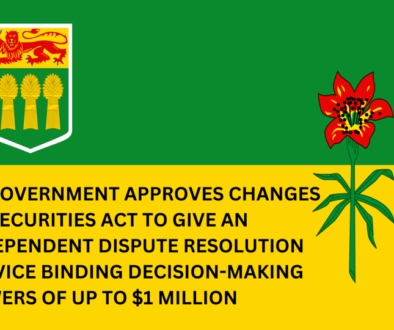CSA Proposes to Ban the Use of the Term “Ombudsman” by Registrants
The Private Capital Markets Association of Canada (PCMA) supports fair and balanced regulation. This article is part of a PCMA series commenting on the Canadian Securities Administrator’s (CSA) proposal to give the Ombudsman for Banking Services and Investments (OBSI) binding decision-making powers under amendments to National Instrument 31-103 Registration Requirements, Exemptions and Ongoing Registrant Obligations (NI 31-103).
The CSA is proposing a ban on registered firms using the term “ombudsman”, “internal ombudservice” or a “substantially similar term” when referring to a department or service of a registered firm or an affiliate that engages in complaint handling.
Proposed new section 13.15.1 is set out below.
| 13.15.1 Prohibited terminology A registered firm must not describe the complaint handling procedures, officers or employees of the registered firm or an affiliate of the registered firm, in a manner that could lead a reasonable client to conclude that the procedures, officers or employees are independent of the registered firm. For greater certainty, and without limiting subsection (1), a registered firm must not refer to a department or service of the registered firm or an affiliate that engages in complaint handling with respect to complaints of the registered firm as independent, or as an ombudsman, internal ombudservice, or a term that is substantially similar. |
The CSA states that using such terminology could be misleading or confusing to a retail investor who may conflate a registrant’s internal complaints handling process with those provided by OBSI under National Instrument 31-103. The CSA provided a detailed explanation of its concerns involving internal “ombudsman” in Joint CSA Staff Notice 31-351, IIROC Notice 17-0229, MFDA Bulletin #0736-M – Complying with requirements regarding the Ombudsman for Banking Services and Investments (“Joint CSA Staff Notice 31-351”).[1]
Many exempt market dealers (EMDs) are small, therefore, having an internal ombudsman dedicated to this function is not feasible. Typically, the Compliance Department of an EMD manages client complaints. However, the PCMA believes that all registrants, including EMDs, should NOT be prohibited from referring to their internal dispute resolution service provider as an ombudsman provided that they follow the guidance provided by the CSA set out in Joint CSA Staff Notice 31-351, which is set out below for ease of reference.
| In communications with clients, we emphasize the importance for firms that use an internal ombudsman to clearly indicate that: the internal ombudsman is employed by the firm or is an affiliate of the firm and, unlike OBSI, is not an independent dispute resolution service; the client may submit a complaint to OBSI without going to the internal ombudsman if the firm has not provided the client with a written notice of its decision within 90 days of the client complaining to the firm; if a client is not satisfied with the firm’s decision, the client may immediately submit a complaint to OBSI without going to the internal ombudsman and that the client has 180 days after receipt of the firm’s decision to submit their complaint to OBSI; the services of OBSI are free; the use of the firm’s internal ombudsman process is voluntary, specifying the estimated length of time the internal ombudsman process is expected to take, based on historical data; statutory limitation periods continue to run while an internal ombudsman reviews a complaint, which may impact a client’s ability to commence a civil action. The disclosure of the services of OBSI should be given at least equal prominence to those of the internal ombudsman and should provide clear, transparent and easy to understand information, including full OBSI contact information, necessary for clients to make an informed decision on their complaint escalation options. |
The above guidance was provided by the CSA in December 2017. The PCMA is not aware of any updates by the Joint Regulators Committee of the Ombudsman for Banking Services and Investments[1] that this stated confusion has continued when following the guidance or any related data. The absence of any updates to the guidance or data suggests that further regulatory intervention is unnecessary and contrary to evidenced-based regulation.
The PCMA also notes that the term “ombudsman” has been used globally for centuries and has meaning for retail investors and should be permitted to be used by registrants provided it is not misleading. The CSA guidance above is helpful in achieving this requirement.
Traditionally, an ombudsman is an impartial officer who investigates complaints but only makes non-binding recommendations. The role is to inquire into decisions and act as a mediator/facilitator, not make final rulings. If an ombudsman is given the power to make binding decisions, their role changes fundamentally from being an impartial complaint handler to more of an adjudicator/arbitrator. This could cause confusion for the public if OBSI retains its name that includes the term “ombudsman” but no longer follows the traditional ombudsman model of making non-binding suggestions to resolve issues. Those using the services of OBSI may incorrectly assume recommendations are non-binding if it maintains the same name if it is granted adjudicative authority. Using a new title, such as “Compliant Adjudicator” would help distinguish OBSI’s changed role with a changed name, if enacted, and make it clear that binding decisions, not just recommendations, would be issued by OBSI.
The PCMA supports fair and balanced regulation and believes that it is in the public interest for the CSA to find the right balance between investor protection and fair and efficient capital markets. The PCMA does not believe the right balance has been struck with the CSA’s proposal to ban the use of the term Ombudsman by registrants in its proposal to give OBSI binding decision-making powers.
Additional Information:
- Other PCMA Articles: For more information about this Article and similar articles, please see the PCMA’s dedicated website to this topic at: www.fairandbalancedregs.com
- Link to Full CSA Proposal to Give OBSI Binding Decision-Making Powers: https://www.osc.ca/sites/default/files/2023-11/csa_20231130_31-103_proposed-amendments.pdf
- Write a Comment Letter: Let the regulators know how the proposed changes will impact your business. The PCMA is working on a template letter for members and it will be made available on the PCMA’s dedicated website to this topic at: www.fairandbalancedregs.com
[2] The Joint Regulators Committee (JRC) is composed of designated representatives of the Canadian Securities Administrators (CSA) and the two self-regulatory organization (SRO)s that amalgamated on January 1, 2023, and are predecessors to the Canadian Investment Regulatory Organization (CIRO), the Investment Industry Regulatory Organization of Canada (IIROC) and the Mutual Fund Dealers Association of Canada (MFDA). The JRC provides oversight of the Ombudsman for Banking Services and Investments (OBSI). (Source: https://www.osc.ca/en/investors/investor-protection/obsi-joint-regulators-committee)




